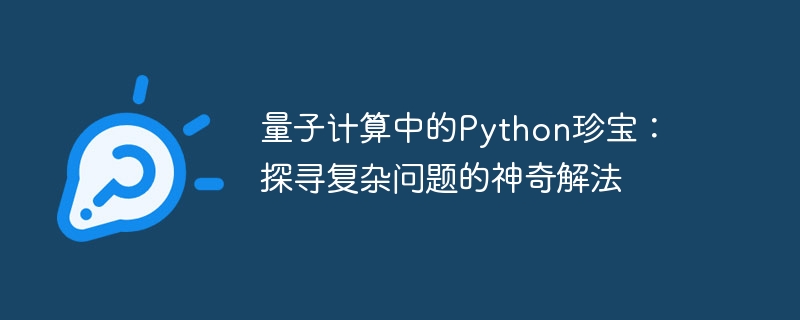

1.Python in Quantum Computing: A Quantum Programming Platform
Pythonis a widely used general-purposeprogramming languagewith a rich set of libraries andtoolspackages, making it ideal for quantum computing. With Python, you can write quantum algorithms and applications and interact with quantum hardware.2.Quantum Data Types and Operations
Python provides specialized quantum data types and operations, such as qubits and quantum gates, allowing you to easily create and operate quantum programs. You can use the Qiskit library to access these data types and operations.3.
Development and implementation of quantum algorithmsPython is an ideal environment fordevelopingquantum algorithms. You can use various libraries and tools to write and implement quantum algorithms, such as Cirq and ProjectQ. These libraries provide tools for building quantum circuits and executing quantum algorithms.
4.Visualization and debugging of quantum programs
Python provides a variety of tools and libraries to help youvisualizeand debug quantum programs. For example, you can use Qiskit Terra's plot_bloch_multivector function to visualize quantum states, or Qiskit Aer's statevector_simulator function to debug quantum programs.
5.Powerful extension libraries and toolkits
Python has a rich set of extension libraries and toolkits that can help you expand the possibilities of quantum computing. For example, you can use Theano or theTensorflowlibrary to build quantum
neural networks, or use the SciPy library for quantumdata analysis.6.Demo code: Quantum algorithm for solving the maximum independent set problem
To demonstrate the power of Python in quantum computing, we provide a demonstration code that uses quantum algorithms to solve the maximum independent set problem. The maximum independent set problem is a classic combinatorial optimization problem. Its goal is to find the maximum independent set in a graph, that is, a group of vertices that are not adjacent to each other.
import qiskit from qiskit import QuantumCircuit, ClassicalReGISter, QuantumRegister, Aer # Define the number of qubits and classical bits num_qubits = 3 num_classical_bits = num_qubits # Create a quantum and classical register qreg = QuantumRegister(num_qubits, "q") creg = ClassicalRegister(num_classical_bits, "c") # Create a quantum circuit circuit = QuantumCircuit(qreg, creg) # Apply Hadamard gates to all qubits for i in range(num_qubits): circuit.h(qreg[i]) # Apply controlled-Z gates to entangle the qubits for i in range(num_qubits): for j in range(i+1, num_qubits): circuit.cz(qreg[i], qreg[j]) # Apply Hadamard gates to all qubits again for i in range(num_qubits): circuit.h(qreg[i]) # Measure the qubits circuit.measure(qreg, creg) # Create a quantum simulator simulator = Aer.get_backend("qasm_simulator") # Execute the circuit result = simulator.run(circuit).result() # Get the measurement results counts = result.get_counts() # Print the measurement results print(counts)
7.Python in Quantum Computing: Infinite Possibilities
The application potential of Python in quantum computing is huge. With the development of quantum computing technology, Python will become an important tool for exploring the quantum world and solving complex problems.
The above is the detailed content of Python Gems in Quantum Computing: Finding Magical Solutions to Complex Problems. For more information, please follow other related articles on the PHP Chinese website!




